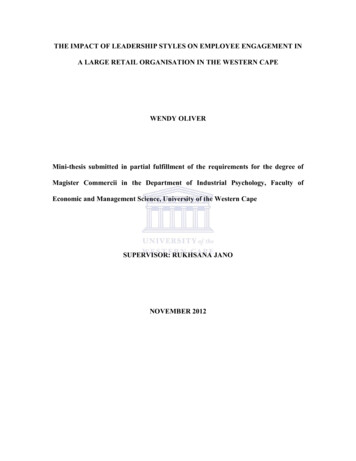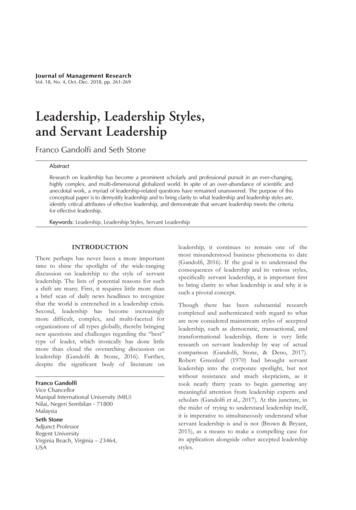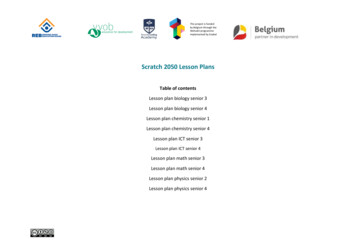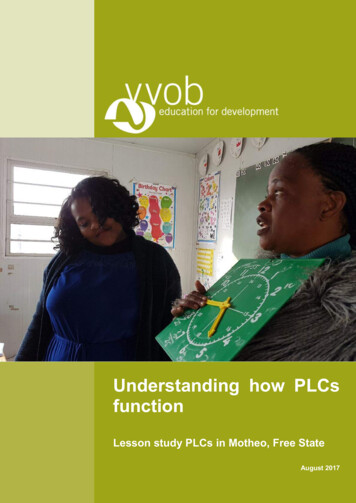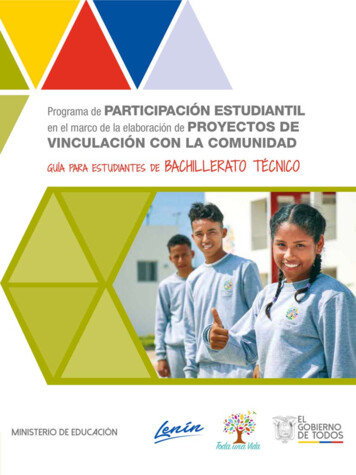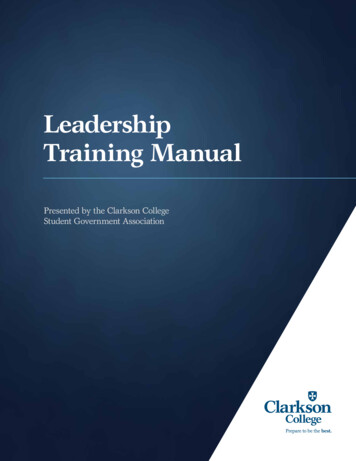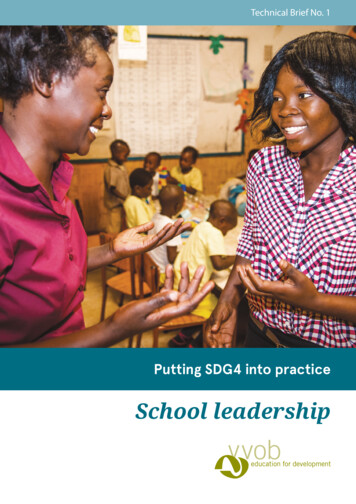
Transcription
Technical Brief No. 1Putting SDG4 into practiceSchool leadership
Putting SDG4 into practice: School leadershipInclusive and equitable quality education provides all learners with the capabilities tobecome economically productive, develop sustainable livelihoods, contribute to peaceful anddemocratic societies, and enhance individual wellbeing. This technical brief describes whyschool leadership matters for quality education and the evidence-based approach VVOB takesto introducing and embedding school leadership in developing countries. The experiences ofVVOB show the value of identifying an appropriate entry point, working with governmentalagencies responsible for training educators, demonstrating the ‘what, who and how’ of schoolleadership through pilot programmes, and institutionalising school leadership in the educationsystem. As described in the case study of VVOB work in Rwanda, developing and embeddingschool leadership requires long-term commitment and solid partnerships.Why school leadership mattersSchool leaders have a vital role in creating the conditions for effective teaching and learning. No school sustainably improves the quality ofeducation in the absence of effective school leadership. Good leaders identify the aspects of their schools on which to focus in order to helpstudents learn. They do this through a set of leadership behaviours that affect student learning.Successful school leadersSchool leaders who are successful:n define their values and vision to raise expectations, setdirection and build trustn structure the organisation and assign roles andresponsibilitiesn shape conditions to enhance the quality of teachingand learningn enhance teacher qualityn enrich the curriculumn build strong relationships inside the school communityn build relationships outside the school community.Source: 10 strong claims about school leadership. National College forLeadership of Schools and Children’s Services. 2010.The evidenceInternational literature identifies effective leadership as a criticalfactor in raising the achievement of learners. Research has shownthat school leadership matters for quality education because:n school leaders who develop, support and evaluate the quality ofteaching have a big influence on learning outcomesn the impact of school leadership on learning outcomes is secondonly to the quality of teaching and learningn effective school leadership is critical for raising learners’achievementn effective school leadership is particularly important in improvingpoorly performing and disadvantaged schoolsn successful school leadership has a positive impact on theentire school.“School leadership has become a priority in education policy agendas internationally.It plays a key role in improving school outcomes by influencing the motivations andcapacities of teachers, as well as the school climate and environment. Effective schoolleadership is essential to improve the efficiency and equity of schooling.”Organisation for Economic Co-operation and Development2
VVOB Technical Brief No. 1School leadership and SustainableDevelopment Goal 4Dimensions of successful school leadershipSchool leadership plays an important part in realising SustainableDevelopment Goal 4 (SDG4): ensure inclusive and equitable qualityeducation and promote lifelong learning opportunities for all. A keystrategy in the vision for education to achieve SDG4, the Education2030 Incheon Declaration and Framework for Action adopted by theWorld Education Forum 2015, is to “Strengthen school leadership toimprove teaching and learning”.VVOB approach to strengtheningschool leadershipVVOB programmes use a model of the dimensions of leadershipaffecting student outcomes developed from research as astarting point.The approach VVOB takes in a country adjusts this model accordingto the country’s experience, challenges and needs. This meansassessing the context and identifying who exactly needs support toimprove school leadership. Local education partners – ministries ofeducation and institutions that are responsible for the professionaldevelopment of school leaders – may need support to empowerschool leaders to improve the quality of education. Professionaldevelopment providers may need assistance from experts. VVOBdeploys a wide range of methodologies, from classical training andworkshops to mentoring, coaching and peer learning, as appropriateto particular circumstances.www.vvob.org3
Putting SDG4 into practice: School leadershipBuilding capacity in school leadershipIn practice, building capacity in school leadership starts withbuilding the capacity of those who provide professional developmentfor school leaders. Initially, this means working to introduce theconcept of school leadership in ministries and other institutions.Once the concept has been accepted, understood and tested by thesepartners, VVOB endeavours to institutionalise school leadershippractices in a country’s education system.The professional development of school leaders throughout theircareers is one of the linchpins of the VVOB approach to schoolleadership. Experience has shown that top-down strategies alone,such as building the capacity of those who provide professionaldevelopment for head teachers, are ineffective and need to becomplemented by strategies that involve school leaders themselves.Programmes follow six principles in developing leadership practicesassociated with improved learning.Building capacity in school leadershipProgrammes to build capacity in school leadership:nnnnnnare embedded in the overall school leadershipsupport systemare stimulated by education leadership at higher levelsare tailored to school leaders’ existing knowledge,practices and contextare sustained, ongoing and intensive, with regular followup support in schoolsemphasise learning-by-doing and reflective practice, andare oriented to implementation in schoolsfocus on student wellbeing and learning outcomes.Leadership practices associated withimproved learningLeaders who improve learning:nnnnnnnbuild a visionget the basics rightshare leadershiplead for learningimprove teachingenrich the curriculumengage the community.Source: Learning achievement: engaging with evidence. A working evidencepaper – version 1. UK Department for International Development. 2014.4
VVOB Technical Brief No. 1Case study: building schoolleadership in RwandaIn 2017, net enrolment in primary education in Rwanda was98%; enrolment in secondary schools continues to rise rapidly.Yet, learning outcomes remain low. As a result, the emphasis hasshifted from enabling access to education towards improving thequality of education. Since 2003, VVOB has been supporting thepush for quality education in Rwanda, initially focusing on schoolmanagement and more recently concentrating on school leadership.Aligning with transitionWhen VVOB began working in Rwanda, the Ministry of Education(MINEDUC) was already moving towards a demand-driven,competency-based schooling. The ministry and VVOB funded athree-year pilot project to enhance the managerial competencies ofschool leaders and school administration support staff in 30 pilotschools. The aim was to strengthen the pilot schools to serve asresource centres for neighbouring schools. The pilot project provedsuccessful. VVOB and the ministry jointly organised trainings inschool management nationally, and developed and disseminatedtraining manuals for school leaders and school administrativesupport staff in all primary schools.In 2007, this initial phase culminated in the ministry’s distribution ofa handbook that explains who does what in school management toguide school managers across the country.Institutionalising changeTo consolidate and sustain progress, the strategy then became toinstitutionalise school management in the education system. In 2008,the ministry and VVOB began looking at how and where to set upa department responsible not only for school management but alsofor school leadership. In 2011, this collaboration led to the formalestablishment of the School Management and Leadership Unit withinthe ministry. The unit is mainly responsible for the quality of schoolleadership and management in basic education and, more specifically,for pre- and in-service training, peer learning, and monitoring andevaluation of school leaders. To establish an in-depth understandingof the principles and practice of school leadership in the new unit,VVOB drew on its extensive network to train the staff.The establishment of the School Management and LeadershipUnit shows the extent to which partners took school leadershipon board and are willing to continue to develop school leaders inRwanda. Testifying to this, school leaders who have passed throughthe training now hold senior leadership positions in the ministry,districts and sectors and are helping spearhead school leadershipacross the country.www.vvob.orgBuilding capacity to sustain momentumBy 2013, the School Management and Leadership Unit was wellestablished and tasked with providing effective, gender-sensitive,professional development for school leaders. Work began ondeveloping a system to extend such professional developmentto school leaders across the country. VVOB and the College ofEducation, a research and training institution under the Universityof Rwanda and the ministry, joined forces to design courses inschool management and leadership. This collaboration led tothe introduction of a post-graduate diploma in Effective SchoolLeadership recognised by the Rwanda Education Board, theinstitution in charge of policy implementation within the ministry. In2016, a first cohort of 397 school leaders, one from each sector, wasawarded the diploma in effective school leadership.Creating an enabling policyTo firmly embed school management and leadership in the educationsystem, the ministry and VVOB continued to work together. Thenext step was the integration of school leadership into the TeacherDevelopment and Management policy, with the aim of making thediploma in school management and leadership compulsory for allschool leaders and new appointees. Together, they also identifiedfive professional standards for effective school leadership. Thesestandards cover in-service assessments, professional development,certification and recruitment, and provide a framework formonitoring and evaluating school leader performance, school leaderreflection and self-evaluation, and promotion.Continuing professional developmentThe Teacher Development and Management policy requires schoolleaders to maintain and advance their knowledge and skills throughcontinuing professional development (CPD). Together with theSchool Leadership and Management Unit and funded by the UKDepartment for International Development, VVOB has developed,piloted and researched professional learning communities (PLCs) forschool leaders as a cost-effective complement to pre-service and inservice training courses provided by experts. Prior experience showsthat a strict focus on individual learning needs to be accompanied bygroup learning: Sharing professional problems helps school leaders tolearn from each other’s experiences and to become more competentleaders.Professional learning communities and coachingTo pilot PLCs, VVOB trained 116 sector education officers on how tolead PLCs and provide ongoing coaching for school leaders.These sector education officers now organise bimonthly PLCs thatreach 962 school leaders. Within each PLC, at least one school leaderis enrolled in the post-graduate diploma. The Rwanda EducationBoard and sector education officers use the standards and norms forschool management and school leadership developed by the SchoolLeadership and Management Unit to monitor performance. VVOBregularly visits the PLCs to assess learning and evaluate behaviouralchanges among school leaders.5
Putting SDG4 into practice: School leadership“ but when we are there we compare thetheory and the practices, so we gain moreknowledge and experience from otherschools ”School leaderLinking school leadersLinking the PLCs and PLC members, Rwanda Education Boardpublishes a biannual magazine (Urunana rw’Abarezi) for schoolleaders and teachers that features articles and testimonies by theircolleagues on key issues, such as school drop-outs, equity at school,and advancing the competence-based curriculum, and provides aspace for sharing experiences and perspectives.While the diploma programme is currently being expanded toreach school leaders in Rwanda’s Eastern and Western province,the challenge is to enroll many more in-service as well as all newlyappointed school leaders in the diploma programme. Having this inmind, VVOB is working together with the ministry to explore waysto deliver the diploma course efficiently through, for example, onlinemodules.Committing to long-term partnershipsVVOB’s experience in strengthening school management andleadership in Rwanda demonstrates the value of a long-termcommitment to stable partnerships, understanding and aligning withgovernment strategies, and providing technical and financial support.VVOB partnerships actively engage government, non-governmentaland development agencies involved in the education sector. VVOBalso has experience in coordinating two task forces, one of whichwas on school leadership. Cooperation helps VVOB to ensure thatprogrammes align with Rwanda’s standards and policies, and that theuse of resources is optimised.VVOB programmes supporting school managementand school leadership in RwandaSchool Management and School Leadership for SecondaryEducation 2008–2013School Leadership and Management Unit formally institutionalisedin the Ministry of Education and 30 resource centres established.2,500 school leaders trained in school management. Standards forschool leadership developed.Common Belgian Technical and Vocational Education andTraining Support 2010–2015Focus on school leadership to lead and support a reform ofthe education sector towards practice-based, demand-driven,competency-based pedagogy.Coaching School Leadership to Achieve High-level LearningOutcomes 2013–2015116 sector education officers trained to lead and PLCs for schoolleaders. School leaders brought together to meet, interact anddiscuss specific school issues and best practices to address them.Learning Outcomes in Primary Education Programme2014–2016Post-graduate diploma in Effective School Leadership developedand recognised by the Rwanda Education Board. A first cohort of397 school leaders graduated in 2016.Girls on MARS (Mathematics Achievements in RwandanSchools) 2017-2021533 primary school leaders in Rwanda’s Eastern and Westernprovince are trained to effectively implement the competencebased curriculum within a gender-responsive environment toimprove pupils’ learning outcomes, especially those of girls, inmathematics via participation in PLCs and enrolment in the postgraduate course in Effective School Leadership.Leaders in Teaching 2018-20211600 secondary school leaders from 14 districts benefit fromimproved delivery, sustainability and institutionalisation of CPDservices through a post-graduate course in Effective SchoolLeadership and participation in PLCs.6
VVOB Technical Brief No. 1Tools and processes for strengtheningschool leadersVVOB has developed products that help Rwandan partnersunderstand, internalise and put learning into practice:Professional standards on effective school leadershipStandards define benchmark practices for assessing school leaders’performance. The standards are now incorporated in the RwandanTeacher Statute.Training needs assessmentTraining needs assessments ensure that programmes start byconsidering the needs of schools and school leaders whendeveloping approaches to building capacity.School leader performance assessment toolAssessment tools include performance assessment criteria and adescription of the types of evidence that school leaders can collectto demonstrate that they can perform or behave according to theprofessional standards for effective school leadership.School leader self-assessment toolsSelf-appraisals and portfolios of evidence demonstrate schoolleaders’ competence. Self-assessments allow them to reflect onpractice, how to use what they have learned, and what works bestin their schools.Going forwardEntrenching school leadership and school management in theRwandan education reform agenda has led to a shift in attitudes.Providers and recipients of capacity building in school leadershiphave come to perceive themselves as agents of change.Currently, VVOB is cooperating with the Rwanda Education Boardand the College of Education of the University of Rwanda to enhanceschool leaders’ leadership in two critical areas: learning outcomes inmathematics and girls’ learning outcomes. This involves introducingand building capacity in gender-responsive and student-centredpedagogies for mathematics among school leaders of two provincesin Rwanda.Going forward, VVOB has started to cooperate with the MastercardFoundation to expand the reach of its programme from schoolleaders in Eastern and Western province to school leaders all overRwanda. What is more, the programme no longer targets primaryschool leaders alone, but secondary school leaders as well. In total,school leaders from 800 secondary schools will participate.Quality auditsContinuous mentoring and coaching in schools follows up oncapacity development, helping school leaders address challenges.Professional learning communitiesPLCs provide a structure for CPD for school leaders, recognisingthat learning stems from learners collaborating rather than from anexpert imparting knowledge.www.vvob.org7
Putting SDG4 into practice: School leadershipSchool leadership for improvinglearning 2017–2021Programmes for 2017–2021 adapt approaches to school leadershipthat have worked well in Rwanda to other countries. Work inRwanda has showed that school leaders need to steer their ownlearning with respect to teaching teachers to improve learningoutcomes. VVOB programmes thus increasingly involve schoolleaders themselves to complement the top-down tactics of developingthe capacity of providers of professional development for schoolleaders. Programmes for 2017–2021 work with school leaders toimprove learning and close achievement and gender gaps in literacy,mathematics and science.RwandaIn Rwanda, 46% of primary school learners in fourth grade do notachieve the objectives for numeracy. To improve pupils’ learningoutcomes in mathematics, VVOB is cooperating with the Ministryof Education, the Rwanda Education Board and the Universityof Rwanda – College of Education to enhance school leadership.Effective school leadership is only second to teacher quality in termsof impact on learning outcomes. By the end of 2021, 533 primaryschool leaders and 800 secondary school leaders throughout 14districts in Rwanda will have graduated in the diploma coursein Effective School Leadership and Management, and willfurther their professional development through participation inprofessional learning communities (PLCs). The diploma course isrevised to include a special focus on student-centred pedagogiesfor mathematics. Best practices to enhance learning outcomes inmathematics are also shared during PLC sessions.8Whereas diverse learning barriers are at play, gender barriers inparticular need to be tackled to improve pupils’ learning outcomesin mathematics, and particularly those of girls. To promote genderequity, VVOB and its partners are working together to mainstreamgender in the diploma course curriculum and to include genderresponsiveness training, all the while seeking to achieve a correctrepresentation of male and female trainers and trainees. Similarly,PLC sessions are geared towards discussing and sharing bestpractices with respect to gender equity.
VVOB Technical Brief No. 1VietnamIn Vietnam, 3–to-5-year-old children from ethnic minorities are struggling to learn. VVOB concentrates its activities on districts withvulnerable ethnic minority populations in three provinces in Central Vietnam to improve the quality of learning in early childhood education.Together with our partners, VVOB builds the capacity of national, provincial and district education ministries to set up professionaldevelopment trajectories for preschool leaders and teachers. In turn, school leaders are then strengthened to support teachers in applyingprocess-oriented child monitoring. This approach allows preschool teachers to closely follow-up on how their learners are developing.Based on the child-monitoring data, school leaders and teachers address specific barriers to children’s learning, such as barriers related togender, the environment and ethnicity.EcuadorIn Ecuador, VVOB contributes to the quality and relevance ofsecondary technical education, making sure that graduates areequipped with skills for work and life. We operate in three provincesstruck by the 2016 earthquake and focus on trades that hold thepromise of decent entry level employment for Ecuador’s youth, suchas construction, auto mechanics, agriculture and tourism. VVOBstrengthens the capacity of the government services responsiblefor the continuous professional development of school leaders andteachers.Through professional learning communities (PLCs), schoolleaders inspire each other to create a safe and supportive learningenvironment, engage in partnerships with the private sector, createprofessional development opportunities for teachers and useevidence from tracer studies to improve the quality and relevance ofthe technical education their schools supply. VVOB also trains andcoaches district-level staff from the Ministry of Education so thatthey, in turn, can support and motivate school leaders that embarkon these innovations.www.vvob.org9
Putting SDG4 into practice: School leadershipSouth AfricaPrimary school learning outcomes in South Africa are among thelowest in the region and dropout rates among the highest, affectingin particular the most vulnerable learners. Fostering a cultureand pedagogy of inclusivity can help to facilitate the inclusion ofvulnerable learners and to break down existing barriers to learning,including gender barriers. By working at national, provincial, districtand school level, VVOB aims to support the implementation of aninclusive education system in South Africa through continuousprofessional development (CPD) of school leaders and teachers.In cooperation with education district officials of the provincesof Free State and KwaZulu Natal, VVOB is setting up professionallearning communities (PLCs) among school leaders and teachersfrom ordinary, full-service and special schools to exchange bestpractices on inclusive policies and practices, and to strengthencooperation between and within schools. At the same time, VVOBis focusing on strengthening the capacity of relevant partners toorganise, monitor and report on a wide spectrum of CPD activitiesthat support inclusion.SurinameIn Suriname, students in lower secondary vocational education are avery vulnerable group, often coming from broken homes or familieswith a low socio-economic status. They have an urgent need for anurturing school environment and for a pedagogy that is more active,competency-based and learner-centred. School leaders are often at aloss for effective strategies to address their students’ needs.VVOB supports school leaders by grouping them into professionallearning communities (PLCs), where a case-based approach is usedto stimulate self-reflection and meaningful exchange. At the sametime, we strengthen the capacity of the Department of VocationalEducation of the Ministry of Education, which is responsible for theorganisation of the PLCs.Democratic Republic of the CongoIn the DRC, technical agricultural education could make a muchgreater contribution to local economic development and youthemployment by equipping students with an entrepreneurialmindset and entrepreneurship skills. In three provinces (BasFleuve, Cataractes and Lukuya) VVOB partners with the Ministryof Primary, Secondary and Professional Education in supportingschool leaders to introduce entrepreneurship education. Togetherwith the provincial inspection services we offer quality professionaldevelopment to school leaders, focusing on the effective managementand pedagogical usage of schools’ production units and crosscurricular collaboration of teachers around competency-basedentrepreneurship education.10
VVOB Technical Brief No. 1About VVOBVVOB is a Belgian non-profit organisation with more than 30 years’experience in sustainably improving the quality, efficiency andeffectiveness of education. VVOB’s annual budget is approximately 11 million.VVOB focusIn pursuit of quality education, VVOB works in two niches, theprofessional development of school teachers and the professionaldevelopment of school leaders, in:n early education to improve the quality of formal pre-primaryeducation and assist the transition to primary schooln primary education to improve literacy, numeracy and life skillsn secondary education leading to relevant and effective learningoutcomesn secondary technical and vocational education and training toimprove quality, align knowledge and skills imparted with thelabour market, and integrate entrepreneurship.As a fundamental principle, VVOB firmly believes that qualityeducation can only be achieved if equity, and particularly genderequity, is achieved in the education system.VVOB expertiseVVOB teams of experts specialise in meeting the most importanteducation needs identified by international research and in theeducation strategies and priorities of VVOB partner countries. We dothis through capacity development and technical assistance.Developing the capacity of localeducation authoritiesFor VVOB, developing the capacity of local educationauthorities means:n professionalising teachers through strengthening teacher traininginstitutions and professional development organisations, andmentoring and coaching systemsn professional development of school leaders through professionaldevelopment organisations, and mentoring and coaching systemsn enabling a strong policy environment for the professionalisationof teachers and school leaders, by enhancing dialogue,communication and collaboration among stakeholders.n offering practical and technical education expertise and supportfor processes through a wide range of methodologies, fromclassical training and workshops to mentoring, coaching andpeer learningn ensuring that partners increasingly take the lead throughoutprogrammes to guarantee sustainability.How VVOB worksAddresses local needs and contextsVVOB aligns its work with national education strategies to inspirepolicies adapted to local needs and contexts.Collaborates with a network of educationalpartnersVVOB develops educational expertise based on its know-how andexchanges within its worldwide and Flemish network of educationalpartners – teacher training institutions, universities, ministriesof education, educational service providers and internationalorganisations.Operational partnersVVOB partners with ministries of education, teacher traininginstitutions and organisations focusing on professional development.Partners range from national and regional governments toinstitutions, individual schools, school leaders, teachers and students.Financial partnersLocal governments finance programmes from their own budgets andwith support from national and international donors, including theBelgian and Flemish governments, the European Union, MastercardFoundation, other foundations and international non-governmentalorganisations.Stimulates cooperationVVOB stimulates cooperation between educational institutionsacross continents.Where VVOB worksVVOB works in 10 countries – Belgium, Cambodia, DemocraticRepublic of the Congo, Ecuador, Rwanda, South Africa, Suriname,Uganda, Vietnam and Zambia – and on assignments in othercountries.Providing technical assistanceFor VVOB, providing technical assistance means:n offering structural and sustainable solutions to support andreinforce the capacities of governments and local educationauthorities responsible for the professional development ofteachers and school leaderswww.vvob.org11
‘Putting SDG4 into practice’ technical briefs:ISBN: 9789078083672 VVOB vzw - 2nd edition 2018ContactsVVOB vzwJulien Dillensplein 1 bus 2A1060 BrusselsBelgiumT: 32 (0)2 209 07 99programmedirector@vvob.be
Source: 10 strong claims about school leadership. National College for Leadership of Schools and Children's Services. 2010. The evidence . graduate course in Effective School Leadership. Leaders in Teaching 2018-2021 1600 secondary school leaders from 14 districts benefit from . www.vvob.org.

